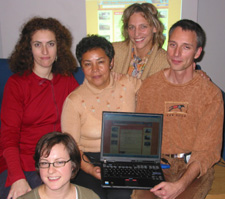Students localize Ecuadorian site

Clockwise from the top left are students Nargisse Rafik, Patricia Sarzosa, executive director, YMCA Ecuador, Deborah Folaron, and students Glenn Clavier and Lindsay Schonfelder.
Photo by Allison Martens
Concordia students are the driving force behind a YMCA Tours Ecuador website that will help that organization bring its ecotourism business to a broader audience.
Ten students in Deborah Folaron’s localization class spent much of the last winter, and some volunteered much of their summer revising the English site, translating it into French, and dealing with technical issues.
Folaron said the work was more challenging than expected. Because the group did not have the original source files to work with, much of the site had to be rebuilt from scratch.
The project was the brainchild of one of the students, Glenn Clavier. Last year, he travelled to Ecuador to volunteer for the YMCA there, and wanted to help the cash-strapped organization market its environmentally-friendly tours.
“I thought it would be a good opportunity for students to get involved in a very practical project, to help the YMCA and to go back to the university’s roots, because Sir George Williams was founded by the YMCA,” he said.
Sir George Williams University grew out of night school classes given by the Montreal YMCA, and Williams was the founder of the international Y movement.
When Clavier approached Folaron with his idea last year, she hadn’t yet finalized a project for the class. “Instead of a fictional project, it was something that could be of use to someone, and she leapt on it.”
The group started by comparing the English and Spanish versions of the site to eliminate discrepancies and tighten the text on the English site. The newly-finessed English site then provided the source text for the translation into French.
Web localization is the process by which a site is tailored to a specific geographic region and language. Among other things, this means ensuring the content and design is consistent with cultural, linguistic and technological norms in the target market.
As one example, languages such as Arabic and Hebrew are read from right to left. English users – who read from left to right – are accustomed to finding content such as menu bars and navigational tools on the left-hand side, Folaron said, while those who read other languages might look elsewhere.
“There’s also the element of making everything uniform. Much of the work we’ve done this semester involves making the content sound like it was written by one person, with one voice,” she said.
Patricia Sarzosa, executive director of the YMCA Ecuador, was the guest of honour at a gathering held at the Graduate Students Association annex on Oct. 14 to launch the site. She was in Montreal last week to attend a meeting of YMCA executive directors from across North and Latin America.
She said the site is important because “it will help us to socialize not only with people from the YMCA, but to establish solidarity with other groups in Europe and North America.”
The YMCA’s ecotourism program aims to show tourists the “real Ecuador,” give local businesses a boost and raise funds for its initiatives, which include youth leadership programs and micro-credit for disadvantaged families.
The new website will go live after every page has been scrutinized for errors. Folaron will chronicle the group’s efforts in an issue of Multilingual Computing and Technology, an industry publication distributed worldwide.
The project for her next class will be a website for the Montreal office of the Social Justice Committee, a non-profit organization.
“This was a great exercise because it was realistic,” she said. “It’s what students will find in website localization projects, and these are skills that are highly desired by employers.”